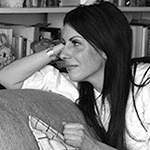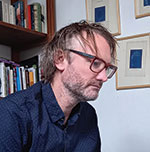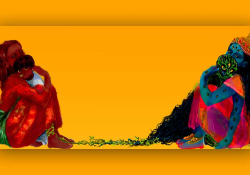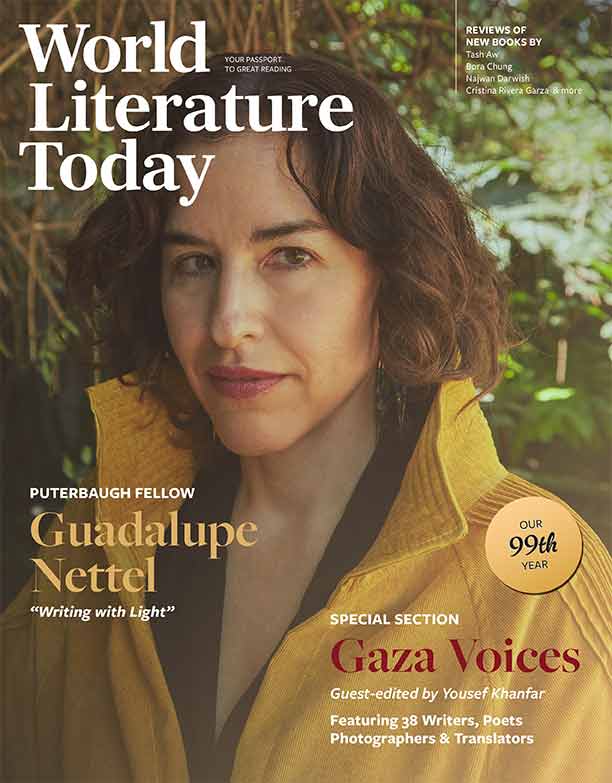A Cough

In this flash fiction from Argentina, a woman with a long list of symptoms empties herself during a medical exam.
“Describe your symptoms for me.”
The electricity bill. The vibrating telephone. An open window knocking against the frame, like a flapping jaw. Bones hauled wearily over tiles. Yellowish skin in elevators. A cat’s dirty flank. A pain in the chest, a burning pain, scuttling rabidly upward, like a spider. The fear of dying alone in the kitchen. In the bathroom. Still dirty.
“Say thirty-three.”
I do.
“Cough.”
I cough half-heartedly.
“No, not like that.”
He taps me lightly on the spine with the stethoscope.
“A real cough.”
I try again. An uncomfortable cough rings out.
The dirty dishes in the sink. The list of chores, hanging from my neck, a mountain range. An earthquake. Long nights of coughing. Other people’s dogs barking.
The doctor takes a notebook from his pocket and scribbles something. The pen scratches across the paper. He comes back into my field of vision and looks at me.
“Help me out here.”
People staring at me in the bank queue. Open seams. Painful nipples after breastfeeding. Nights spent face down. Days face up. A panicked tingling in the wrists and ankles.
He places the stethoscope on my forehead, as though he were threatening me at gunpoint. The cool feel of the metal, pressed against my skin, like a brand.
He goes back around behind me. I bend over to gather my strength. The air bubbles between my vertebrae burst. I suck air into my chest, my ribs rise obediently.
I’m going to cough.
I close my eyes, take a deep breath, and cough furiously.
Our neighbors’ children’s children. Broken locks. The music at a primary school performance. A boss’s hand banging on the desk. A chicken bone stuck in the throat. Two summers without the money for a vacation. “For sale” signs. A fever thickening the blood. Wishes floating in a bucket. An abandoned house. Air coming in but not going out. Whistling in your diaphragm.
I cough. My mouth opens and my spine rushes out between my teeth, clean as a fish bone. It falls with a rattle, lying there like a party dress on the floor, by the examination table. I feel more pliable but just as sick.
I cough. My mouth opens and my spine rushes out between my teeth, clean as a fish bone.
“Again.”
I take a breath and bunch up. Concave now. I cough angrily: a long, deep cough that courses through me, sweeping my liver, heart, and spleen out through my mouth. My hips emerge with difficulty, scratching my gums a little. Out come the ulna, radius, femur, coccyx, and parotid glands.
The taste of salt in my mouth. Distant relatives. The smell that money leaves on your hands. All the surfaces in the world infested with invisible bacteria and fungi and spores.
The white glare hurts my eyes. It bounces down from the shelves, the walls, a gleaming metallic cascade. Scalpels, spoons, otoscopes, forceps, knives: painful gems.
“Close your eyes.”
I obediently cover them with my arm.
The stethoscope slides over toward the medulla.
“Again.”
My dismantled back contorts pliably. I open my mouth. Out comes the mediastinum, fluttering its wings like a ghost. My elbows, thyroids, and pancreas swoop out, blotting the clean air of the surgery.
The stethoscope conducts the concert. One tap for a cough, then another, and another.
One’s body like a pain in the chest. A pain in the chest like a body. Electricity flowing like water along the veins. Another cough, and another.
The tendons and muscles are liberated, emancipated. Out come the pelvis, the humerus, tissues.
I’m getting stretched and empty, feeling less oppressed, sad, on the examination bed.
“Again.”
Air flows in and swirls. A monstrous cough forces out the slippery rose of my brain. It crashes against a column and slides on a little further, rolling, lubricated, leaving a sticky slug trail. The momentum takes the tongue with it, leaving it lying at the doctor’s feet. A pink, hibernating animal.
A monstrous cough forces out the slippery rose of my brain.
Contaminated vegetables. Dry leaves. Addition. Subtraction. He puts the stethoscope down on the desk and reaches for a black bag, the kind they use to take out the trash, pulls on disposable gloves, and gathers up each of my body parts, putting them in the bag. It’s barely half-full.
He opens the bin for medical waste and drops it all inside. Then he takes off the gloves and drops them in too.
Photos of my mother when she was young. The television always on. Meat going off in the fridge. Dad sleeping in a borrowed bed, waiting for death only he doesn’t know it.
With his cold hands, the doctor picks up what’s left of me. He folds me the way you fold up a blanket when winter is over.
He opens the doors to the only cabinet in the surgery room, and on a high shelf, the highest—the others are occupied—he places my disinflated body. He takes his time settling me in.
Then he closes up.
How quiet this shelf is. How dark. How weightless.
I listen to him rearranging his chairs, tidying his desk.
The light goes out.
Then comes the click of the door closing.
The shuffle of his soles walking away over the lobby carpet.
And then nothing more.
Translation from the Spanish












